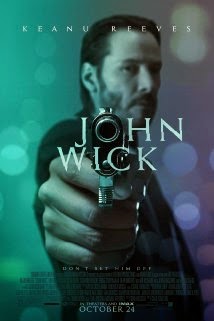 |
| John Wick: Don't Set him Off |
It seems that in almost all films with male leads,
particularly revenge stories, the male is always motivated to tap into his
carnal, violent side, which is prompted by the death (or murder as my previous
review on Horns indicated) of his significant other – almost always a
woman. In the case of John Wick, his
wife has barely a few minutes of screen time before she is killed off,
presumably by a longtime battle with a disease.
Helen (Bridget Moynahan), before her death is assumed to have arranged a
gift for her widowed husband. Posthumously,
John receives a puppy from his late wife that he aptly named Daisy.
Daisy is a clever plot device that represents the presence
of his wife without having a woman on screen.
When John has a tiff with a couple of Russians outside a gas station,
they decide, boldly and naïvely to “set him off.” Lead by Iosef Tarasov (Alfie Allen) the son
of Russian mobster, Viggo -the Russian version of the most interesting man in the world (Michael Nyquist), they enter his home, kill his dog, and steal his
car. Inept Iosef – a boy trying to fill
a man’s shoes – has no idea he just awakened the beast. Keanu Reeves never looked better in black
then he does in this film; draped in form fitting suits that fasten like armor,
John Wick inflames the whole assassin community in search of his revenge.
The film plays out like a video game with no hesitation to
the violence enacted. The body count
rises at each turn of the corner with no remorse. One cannot help but wonder, with violence
such as this often normalized is masculinity constructed to accept male
aggression as innate? John Wick shows
very little compassion and even less emotion – an expected trait in assassin
films. But while this style of storytelling
is compelling to watch on screen the fact that there is an expectation in our society,
for males to express a detachment of humanity is frightening.
As much as I enjoyed watching Keanu Reeves take down the
villains with blatant disregard, the image of male power encased in violent
acts defines masculinity with a sense of brutality, bloodshed and a
destructiveness that has little room for anything else. The film seems, on the surface, simple
enough, but liberation from gender roles is not just for women. Men desperately need to learn how to
deconstruct the rigid stereotypes in order to navigate in healthy ways not just
with women, but with other men too.
Most action and thriller films are heavily violent, but most
of that violence is male against male. We
don’t think twice about the consequences as being socially deadly, but when the
patriarchal system we live in condones bestial clashes between men, and defines
them as a normal part of manhood, we inadvertently create an unsafe environment
for people.
Overall, John Wick, the film, is decent as any action
film. It is superficially entertaining,
and deeply educational on a sociological perspective. John Wick, the man, is an anti-hero with very
few layers of complexities. Yet, you
root for him up until the end.
No comments:
Post a Comment